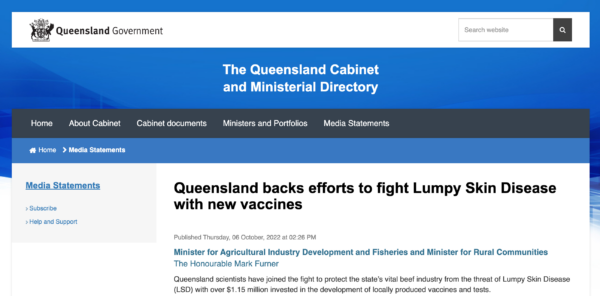- Watch The JD Rucker Show every day to be truly informed.
At least five states have introduced bills restricting the use of controversial mRNA technology or gene therapies in livestock or demand full disclosure to consumers on product packaging.
The states considering legislation include North Dakota, Tennessee, Arizona, Idaho, and Missouri.
Idaho House Bill 154 would make it a misdemeanor offense for anyone who provides or administers a vaccine using mRNA technology “for use in an individual or any other mammal in this state.”
Arizona House Bill 2762 requires conspicuous labeling of all aquatic, livestock, or poultry products that received mRNA vaccines, and prohibits these products from being labeled as organic.
Tennessee House Bill 0099 amends an existing law to prohibit the manufacture or sale of livestock or meat that contains mRNA “vaccine of vaccines materials” without a conspicuous label that there are such ingredients in the product.
In North Dakota, state lawmakers filed SB2384, which seeks to ban the use of mRNA vaccines in humans and to introduce a penalty for anyone breaking the prohibition.
Missouri State Rep. Holly Jones, a Republican, is the lead sponsor of a bill requiring product labeling of all livestock meat containing “potential gene therapy products.
“We label everything around the world. We label non-GMO. We label GMO. We label grass-fed. We label no antibiotics used. We label manufactured in a plant that has nuts,” Jones said.
“We should label anything that has not been proven safe and effective. As we’ve seen with the COVID vaccines, they’re neither safe nor effective. Even the CDC has come out with that.”
While HB1169 does not mention mRNA by name, the proposed ban would include all “potential gene therapy products.”
The House Emerging Issues subcommittee will review an amended bill on April 19. Jones is a member of that committee.
The bill would require labeling of any product created to act as a potential gene therapy, or that could “otherwise possibly impact, alter, or introduce genetic material or a genetic change into the user of the product.”
It would include anyone exposed to the product or people “exposed to others who have used the product.”
With the passage of HB1169, the law would require livestock farmers and producers in Missouri to fully display on product packaging mRNA technology used in cows, pigs, and other livestock under the rule of informed consent.
Don’t just survive — THRIVE! Prepper All-Naturals has freeze-dried steaks for long-term storage. Don’t wait for food shortages to get worse. Stock up today. Use promo code “jdr” at checkout for 25% off!
Already In Development
“They would have to tell us if they begin using those things. As it is currently, almost all states do not,” Jones said.
Jones said she confirmed through multiple agricultural sources that mRNA programs for U.S. livestock are “in the works.”
“It is in the pipeline. Australia is already doing that.”
According to a statement from the Queensland government in Australia, scientists are working to develop an mRNA-related vaccine to combat the threat of Lumpy Skin Disease (LSD) in beef cattle with $1.5 million invested.
“A new mRNA vaccine would be a game changer as the live virus vaccines currently available overseas cannot be used in Australia,” said Mark Furner—the Minister for Agricultural Industry Development and Fisheries and Minister for Rural Communities—in the statement.
“Using existing vaccines here would result in us losing our disease-free status,” Furner added.

With mRNA technology, as in COVID-19 vaccines, the injections introduce a virus fragment into cells, teaching them how to produce a specific antibody against the disease.
The Veterinary Microbiology and Preventive Medicine Department at Iowa State University is developing an mRNA-based cattle vaccine for the bovine respiratory syncytial virus (RSV).
Untreated, RSV can lead to pneumonia in cows.
The federal grant program aims to develop a “novel mRNA system” that provides immune protection against RSV.
“We hypothesize that a [mRNA injection] delivered continuously by vaccine implant will lead to prolonged and robust cellular and antibody immunity,” according to a program summary in the U.S. Department of Agriculture’s Research, Education, and Economics Information System (REEIS).
“Here, we will optimize our vaccine further and then test for potential correlates of protection to examine for in eventually challenged cows.”
No Labeling of Foreign Meat
In 2016, the U.S. Congress removed a labeling law requiring the country of origin on meat products.
“That means we could take beef from Argentina, Australia, China—anywhere around the world—and this gets mixed in because we no longer have to label it as country of origin.
“That strikes an issue with me,” Jones told The Epoch Times.
The National Cattlemen’s Beef Association recently stated that “there are no current mRNA vaccines licenses for use in beef cattle in the United States.”
“Cattle farmers and ranchers vaccinate cattle to treat and prevent many diseases, but presently none of these vaccines include mRNA technology.”
In August 2022, mRNA vaccine research start-up Genvax Technologies received $6.5 million in grant funding through a coalition of private investors, including United Animal Health.
“The threat posed to producers and consumers by foreign animal diseases like African swine fever (ASF) and constantly mutating variants of swine influenza is extraordinary,” Joel Harris, CEO and co-founder of Genvax Technologies, said in a release published in PorkBusiness.com.
“The goal is to develop a vaccine that matches 100 percent to the specific strain when a disease outbreak occurs.”
While ASF is a viral disease that is almost always fatal in domestic and wild pigs, it does not threaten human health and can’t spread from pigs to people.
“It is not a food safety issue,” the USDA states on its website.
“ASF is found in countries around the world. More recently, it has spread to the Dominican Republic and Haiti. ASF has also spread through China, Mongolia, and Vietnam, as well as within parts of the European Union.
“It has never been found in the United States—and we want to keep it that way.”
The Animal Health Institute (AHI) reports that mRNA vaccines used in veterinary medicine are at least five to 10 years away from deployment.
“New vaccines that use mRNA technologies to control parasites could allow more effective vaccines that can be reliably produced. Parasite vaccines developed through traditional methods are often difficult to reliably manufacture for companies,” the AHI’s website says.
“As a result, only a handful of parasite vaccines are available in veterinary medicines. However, mRNA could allow for more reliable production as these can avoid the difficulties of traditional methods.”
Not All Harmful?
Jones, however, said her bill does not mean she considers all mRNA technology harmful.
“They’re using it in many different medical studies and clinical trials. We do a good job of covering up things that may or may not be the best for us.
“I would like to see is that informed consent for consumers. I will fight for that tooth and nail.”
“What we’re asking is tell us if you are a cattle rancher or a pig farmer—if you choose to go that route with vaccinations—people should have that awareness whether to purchase that meat or 100 percent organic.”
Jones said lobbyists accused her of creating fear among consumers and affecting the “bottom line.”
Don’t wait for a stock market crash, dedollarization, or CBDCs before securing your retirement with physical precious metals. Genesis Gold Group can help.
“That’s upsetting to me. I have a strong moral standing that everyone has a right to choose what they put in their bodies.”
Texas Cites Concerns
On April 3, Texas Agricultural Commissioner Sid Miller said his office is working on a “fact-based analysis” of the risks associated with mRNA technology in food and livestock.
“Since news of the development of mRNA vaccines and mRNA-related treatments for livestock came to the attention of the Texas Department of Agriculture (TDA), we have been working towards developing a fact and science-based assessment of the risks associated with this technology,” Miller said in a statement.
“Our analysis will include the clinical research, the structure of existing Texas law, and the public policy, economic, and production impact of the different policy prescriptions we may adopt.
“I aim to ensure that Texas agriculture remains safe, trusted, healthy, and wholly uninfected by dangerous or unproven technology.”
“I personally take this issue very seriously. No political hot takes. Just a well-reasoned and well-researched proposal based on a wide range of input from stakeholders, scientists, agriculturalists, and other experts.
“We are looking at this issue at TDA and will share your concerns.”
The Texas agriculture department’s communications director Reb Wayne said many Texans expressed their concerns regarding mRNA technology.
Wayne said the department’s goal is “a safe and abundant food supply.”
“Our work is in its initial stages, and Commissioner Miller wants to make sure that both the [agricultural] industry and the general public are dealing with the facts on mRNA,” Wayne told The Epoch Times.
Jones said the Missouri legislation is for businesses and people who “deserve to know” the effects of mRNA in food and other products.
“We want to make sure people not only have informed consent and transparency in their food supply, but that if something happens without their knowledge, there is a way to stand firm,” Jones said.
BETTER THAN DRUDGE: N.O.Q. Report is BACK as the conservative aggregator America needs.
“This is spreading like wildfire. And rightfully so.”
Article cross-posted from our premium news partners at The Epoch Times.

It’s becoming increasingly clear that fiat currencies across the globe, including the U.S. Dollar, are under attack. Paper money is losing its value, translating into insane inflation and less value in our life’s savings.
Genesis Gold Group believes physical precious metals are an amazing option for those seeking to move their wealth or retirement to higher ground. Whether Central Bank Digital Currencies replace current fiat currencies or not, precious metals are poised to retain or even increase in value. This is why central banks and mega-asset managers like BlackRock are moving much of their holdings to precious metals.
As a Christian company, Genesis Gold Group has maintained a perfect 5 out of 5 rating with the Better Business Bureau. Their faith-driven values allow them to help Americans protect their life’s savings without the gimmicks used by most precious metals companies. Reach out to them today to see how they can streamline the rollover or transfer of your current and previous retirement accounts.










